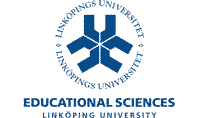|
|
| |
| SYLLABUS |
| Teaching Practice,
8 ECTS Credits |
| |
COURSE CATEGORY Single Subject Course
MAIN FIELD OF STUDY Övriga ämnen - ÖÄA
SUBJECT AREA
|
|
COURSE CODE |
|
924G07 |
|
| AIM OF THE COURSE |
After completing the course the student should
- have basic knowledge about Swedish school politics, the Swedish school system and school cultures
- be familiar with different teacher identities and leadership styles
- be able to describe and reflect on similarities and differences in different countries’ views on education and learning
- be able to plan, carry out and evaluate sequences of teaching in the curriculum
- be able to reflect on his/hers professional development as a teacher |
| CONTENTS |
| The course offers a brief introduction to current political and pedagogical perspectives on education, teaching and learning. Research on teacher identities and leadership styles is presented and discussed. The course has a comparative approach where students are encouraged to share their knowledge and experiences in seminars and through group-work. The course comprises 20 days of teaching practice and field studies at a school or pre-school. Class-room observations, interviews and active participation in teaching and other school activities provide a framework for analysis of the issues presented in the course. |
| TEACHING |
| Lectures, literature studies, seminars, field studies and teaching practice. |
| EXAMINATION |
The examination consists of two parts:
1) Teaching practice (4 ECTS credits)
2) Written examination (4 ECTS credits)
The teaching practice is assessed by active participation during 20 days of teaching practice and field studies. The written examination is handed in at the end of the course. The final grade is based on the individual written examination.
Students failing an exam covering either the entire course or part of the course two times are entitled to have a new examiner appointed for the reexamination.
Students who have passed an examination may not retake it in order to improve their grades. |
| ADMISSION REQUIREMENTS |
Previous teaching practice during at least 2 years of teacher education.
Documented knowledge of English equivalent to Engelska B/Engelska 6, i.e. English as native language or an internationally recognized test, e.g. TOEFL (minimum scores: Paperbased 575 + TWE-score 4.5, internetbased 90 TWE-score 20), IELTS, academic (minimum score: Overall band 6.5 and no band under 5.5), or equivalent. Exemption from Swedish B. |
| GRADING |
| The course is graded according to the ECTS grading scale A-F |
| CERTIFICATE |
| Course certificate is issued by the Faculty Board on request. The Department provides a special form which should be submitted to the Student Affairs Division. |
| COURSE LITERATURE |
|
The course literature is decided upon by the department
in question. |
| OTHER INFORMATION |
Planning and implementation of a course must take its starting point in the wording of the syllabus. The course evaluation included in each course must therefore take up the question how well the course agrees with the syllabus.
The course is carried out in such a way that both men´s and women´s experience and knowledge is made visible and developed. |
| |
Teaching Practice
Teaching Practice |
| |
Department responsible
for
the course or
equivalent:
IBL - Department of Behavioural Sciences and Learning |
| |
|
|
|
|
|
| Registrar No: 242/07-41
|
|
Course Code: 924G07 |
|
|
|
| |
|
Exam codes: see Local Computer System |
|
|
|
| Subject/Subject Area : Övriga ämnen - ÖÄA |
|
|
|
|
|
| |
|
|
|
|
|
| Level |
|
Education level |
|
|
Subject Area Code |
|
Field of Education |
|
| G2X |
|
Basic level |
|
|
UV1 |
|
VU |
|
|
The syllabus was approved by the Board of Educational Sciences 2008-12-16
Last revised 2012-10-15
|
|
|
| |
